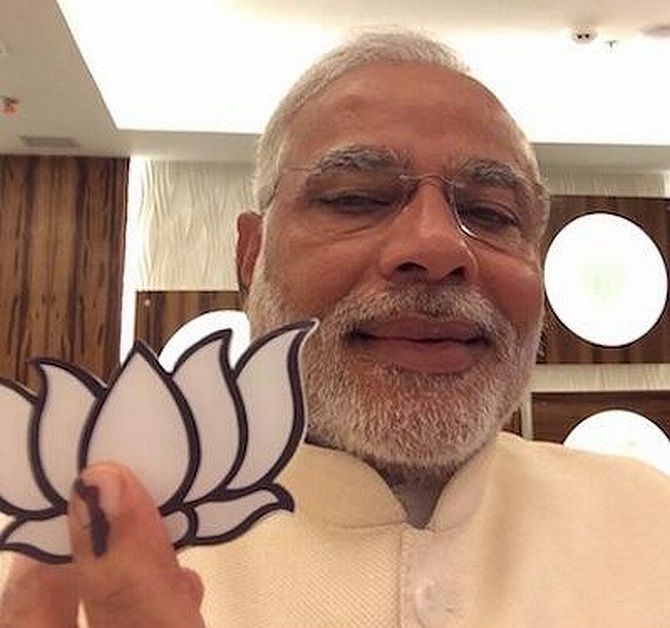The term that was coined as part of a satire article has now been deemed a genuine mental condition!

Photograph: @narendramodi/Twitter.
In 2014, a spoof news story coined the term 'Selfitis' to describe obsessive selfie-taking and suggested that the American Psychiatric Association was considering classifying it as a disorder.
It prompted researchers at Nottingham Trent University in the United Kingdom and Thiagarajar School of Management (TSM) in India to investigate if there was any truth to the satire. They have now confirmed that 'Selfitis' is a genuine mental condition.
The paper on the study -- published in the International Journal of Mental Health and Addiction -- was authored by Dr Janarthanan Balakrishnan of TSM and Dr Mark Griffiths, Distinguished Professor of Behavioural Addiction in Nottingham Trent University's Psychology Department.
Dr Balakrishnan, who is also a research associate in Nottingham Trent’s Department of Psychology, told The Telegraph, 'Typically, those with the condition suffer from a lack of self-confidence and are seeking to "fit in" with those around them, and may display symptoms similar to other potentially addictive behaviours.
'Now the existence of the condition appears to have been confirmed, it is hoped that further research will be carried out to understand more about how and why people develop this potentially obsessive behaviour, and what can be done to help people who are the most affected.'
Dr Griffiths was quoted as saying, 'We have now appeared to confirm its existence and developed the world's first Selfitis Behaviour Scale to assess the condition.'
They discovered three levels of Selfitis.
Borderline Selfitis refers to 'taking photos of one's self at least three times a day but not posting them on social media'.
Acute Selfitis involves 'taking photos of one's self at least three times a day and posting each one on social media'.
Chronic Selfitis means an 'uncontrollable urge to take photos of one's self round the clock and posting the photos on social media more than six times a day.'
The Telegraph reported, 'The scale, which runs from one to 100 was developed using a large number of focus groups with 200 participants to determine what factors drove selfitis. It was scale tested using a survey of 400 participants.
'Participants were based in India because the country has the most users on Facebook, as well as the highest number of deaths as a result of trying to take selfies in dangerous locations.'
The researchers also released the test that can be used to determine the severity of 'selfitis' into the public domain.
The Selfitis test
1. Taking selfies gives me a good feeling to better enjoy my environment
2. Sharing my selfies creates healthy competition with my friends and colleagues
3. I gain enormous attention by sharing my selfies on social media
4. I am able to reduce my stress level by taking selfies
5. I feel confident when I take a selfie
6. I gain more acceptance among my peer group when I take selfie and share it on social media
7. I am able to express myself more in my environment through selfies
8. Taking different selfie poses helps increase my social status
9. I feel more popular when I post my selfies on social media
10. Taking more selfies improves my mood and makes me feel happy
11. I become more positive about myself when I take selfies
12. I become a strong member of my peer group through selfie postings
13. Taking selfies provides better memories about the occasion and the experience
14. I post frequent selfies to get more 'likes' and comments on social media
15. By posting selfies, I expect my friends to appraise me
16. Taking selfies instantly modifies my mood
17. I take more selfies and look at them privately to increase my confidence
18. When I don't take selfies, I feel detached from my peer group
19. I take selfies as trophies for future memories
20. I use photo editing tools to enhance my selfie to look better than others
Scoring: Responses are rated on a 5-point Likert scale: (5 = strongly agree; 4 = Agree; 3 = Neither Agree or Disagree; 2 = Disagree; 1 = Strongly Disagree).
Scores are summed. The higher the score, the greater the likelihood of Selfitis.











